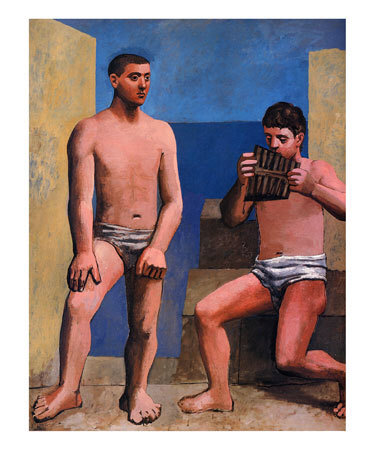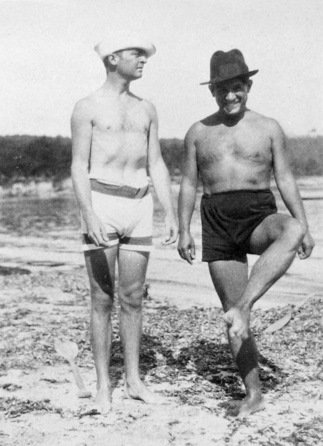I’ve started reading a biography of Gerald and Sara Murphy.

They were a young couple, both from wealthy families, who lived in Paris and spent summers on the French Riviera in the 1920s. They were sort of the anchors for the “Lost Generation” as Gertrude Stein called them all. The Murphys had money, although living in France was very cheap in American dollars after World War I (unlike now). Some of the reasons why so many young Americans moved to Paris then included Prohibition, the perception that America was crass and materialistic (Sinclair Lewis wrote Babbitt in 1922.), and the ability to live very cheaply. In Cole Porter’s song “You’re the Top”, whose words have changed over the years as fashions changed, one of his examples of something “top” was “The Coolidge dollar.”
Aside from a wealthy patron and “bartender” for the other expatriates, Murphy became an excellent painter. His style was his own with a sort of cubist method of depicting machinery like “Watch,” painted in 1925 .

One of his paintings, now lost, was the size of a billboard and dominated the exhibition since it was too large for the room in which it was to be exhibited. It was titled Boatdeck and was 18 feet high. One of their friends during the summers they spent at Cap D’Antibe on the French Riviera was Pablo Picasso, who painted Sara Murphy as “the Woman in White.” There has been speculation that they had an affair but most knowledgeable people doubted it because she was not one to do that although she was very beautiful and sensual. He later painted over two figures in another painting from the period.

There are two other figures painted over in this painting , thought to be images of Sara and Picasso. Xrays have shown them in recent years and it was known that this was part of a series. Perhaps his advances were rejected or deflected, for they remained friends, and he modified the painting.

This photo, of Gerald and Picasso, is thought to be the model for the painting above. The other two figures were to be Venus (Sara) and Eros or Cupid. The latter may have been another image of Picasso, the lover.
The Murphys were friends of Cole Porter and his wife Linda; Gerald had befriended Cole at Yale when both were undergraduates and interested in art. Cole was bisexual but Gerald has no history of any homosexual encounters although sexual identity was quite loose in those circles at the time.
The recent movie of Cole Porter’s life got me interested in the Murphys since they are prominent throughout the movie and were friends of Porter’s until his death. They had three children, two boys who died in their teens, and a daughter who lived until 1998 and wrote a biography of her parents. After the boys died, one of tuberculosis after a long illness, the other, suddenly of meningitis from a mastoid infection, Gerald never painted another picture.
For anyone who has read the novels of F. Scott Fitzgerald and Hemingway, these people are of great interest. For example, Fitzgerald’s novel Tender is the Night uses the Murphys as models for the couple in the story. Sara hated the novel because the events that occur in the novel had nothing to do with the Murphys’ lives. Hemingway is said to have modeled his couple in The Snows of Kilimanjaro on the Murphys. In both cases, the rather unflattering (Hemingway), or overly familiar portrait of her (Fitzgerald) seems to have been the result of her rejection of sexual advances by each author.
They were a major part of the art scene in Paris in the 1920s and knew everyone. I have walked Paris seeking out the scenes from that era and my next trip will include some pilgrimmages to the Murphys’ haunts.
I recommend the book. Here is a review of the book from the NY Times in 1998 when it was published.
Tags: art, Hemingway, John Dos Passos, Paris, Picasso, Scott Fitzgerald
Intersting post. Here is a link that may interest you as it has some photographs of some of those mentioned above.
http://www.newyorker.com/online/2007/08/06/slideshow_070806_schjeldahl?slide=1#showHeader
Thanks. That’s a nice collection of photos. I knew about the Williams College exhibit but not the New Yorker article. I’m going to read Honoria’s book (their daughter) next.